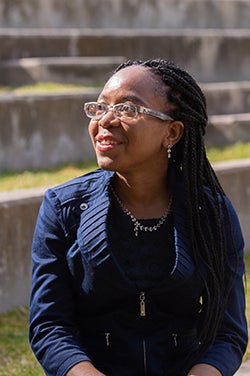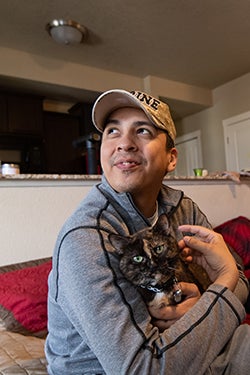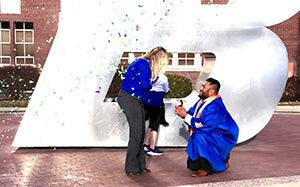Welcoming Veterans
University programs invite military veterans to find their place on campus
Eluterio Escamilla had a proud moment recently. It was late in the afternoon on a Friday – a time when many people have begun their weekend, either physically or mentally.
“I walked out of my office. My whole team was still there,” Escamilla said. “I told them, ‘You know it’s 5 o’clock, right?’ But they weren’t rushing home. I have a team that’s committed to helping veterans.”
Escamilla, Veteran Services Center director at Boise State, is a U.S. Marine Corps veteran. He grew up in the Central Valley of California, son of a farmworker and a certified nursing assistant. He enlisted straight out of high school.
“My dad had dreams and wanted something different for me,” Escamilla said. But he credits the Marines with readying him for college. The Vietnam veterans who trained him told him he read too much and should go to school. That inspired him to use his military education benefits, he said. A first-generation college student like many of the students he now serves, Escamilla left the Marines as a lance corporal and earned his degree thanks to the GI Bill.
An Open Door
Boise State supports its 1,200 student-veterans through the Veterans Student Support Services program within the Veteran Services Center on campus. It’s one of just 16 programs of its kind in the country.
The center helps student-veterans transition into university life and access their GI Bill educational benefits. It offers academic guidance and tutoring, a writing lab, advice on scholarships, career paths, and budget management.
“We all know that if students start on day one with the resources they need, their success rate increases,” Escamilla said.
Over the past year, 346 student veterans have earned certificates and degrees, at every level from associate degrees to Ph.D.s
“Myself and members of my team were influenced by people who said, ‘Hey, you can do more than what you’re doing now.’ So that’s one of our messages for veterans: If you want a different life, start at Boise State.” – Eluterio Escamilla, director of the Veteran Services Center and U.S. Marine Corps veteran.
More Broncos with military ties
In addition to the Veteran Services Center, Boise State is home to Army ROTC, Veterans Upward Bound – a TRIO program that helps ready veterans for college – and Military Programs, a branch of Extended Studies.
Military Programs work with students who are on active duty and those in the National Guard or Reserve. The programs allow students to attend Boise State in a way that fits their military schedules, including offering online classes and credit for prior learning. Military Programs served more than 300 students in 2021.
Boise State’s Military Tuition Assistance Promise Program fills the gap between federal tuition assistance and the cost of tuition. The promise program is available for eligible online degree programs. These programs are particularly suited for students who are deployed or who are serving overseas.
“Everything we do is around flexibility and accessibility,” said Sean Hunter, director of community educational outreach in Extended Studies, and an officer in the Idaho National Guard. This is a trailblazing partnership between Boise State and the military.”
He likened the partnership to workforce development.
“The military wants people with certain skills. We can provide them,” Hunter said.
Meet Three Student-veterans at Boise State
Davena Hoskins, veteran, U.S. Air Force
At 24, Davena Hoskins already has a six-year military career behind her with five years in the U.S. Air Force and one year in the Idaho National Guard. She’s also making her name as a writer. She and her older brother Jason, who recently ended his time in the Air Force as a senior airman, have co-written nine books, a mix of military science fiction, fantasy, horror, and romance under the shared pen name, D.J. Hoskins. The siblings are currently working on their tenth book, a collection of short stories.
A junior majoring in creative writing, Hoskins grew up in New Mexico, Virginia, and Oregon, a kid devoted to gymnastics and anime. After high school, she debated between going to college, taking a gap year, and joining the military.
“I wanted to jump out of the nest, be independent, and write freely,” Hoskins said. “I chose the military so I could support myself.”

She enlisted in the Air Force when she was 17. She served on bases in South Carolina, Turkey, and Germany as a supply chain specialist. She came to Idaho because her brother was stationed at the Air Force base in Mountain Home, Idaho.
“A lot of my self-identity and the way that I saw myself in relation to the world stemmed from my military rank,” Hoskins said. “I couldn’t relate to a lot of other students at first. I had to forge a new understanding of myself.”
The Veteran Services Center became a place to vent, to share “sea stories” – the catchall phrase for stories about military service – and a sanctuary for Hoskins. She works at the center as an English tutor and relishes being a student herself. Her writing classes, she said, have exposed her to literary fiction and the “new vocabulary” of literary criticism. In turn, she said, she and her fellow veterans have contributed to classroom discussions by sharing their experiences – so different from those of most students.
Soon, Hoskins will have even more support at Boise State. Her brother Jason has enrolled as a full-time student.
Jesus Cervantes, veteran, U.S. Marine Corps
Jesus Cervantes joined the U.S. Marine Corps a few years after high school. It wasn’t the uniform that drew him to enlist, he said. It wasn’t the commercials, it wasn’t the recruiters.
“Being a kid raised in Chicago on the poor side, I enjoyed the endurance, the toughness level,” he said.
Cervantes’ family moved from Iguala in the Mexican state of Guerrero to Chicago when Cervantes was a baby. He grew up loving sports, especially the Chicago Cubs. He played basketball and baseball in high school. Cervantes spent eight years in the Marines and earned the rank of sergeant. He was a driver, transporting equipment and personnel. He loaded ships and spent time in Australia doing simulated combat training with the Australian military. He also served in Iraq.
“I was a Swiss Army knife guy, doing lots of different jobs,” he said.

He was still in the Marines when he watched a Boise State football game on television.
“ESPN did a special halftime show about the city. That’s what attracted me. Boise was completely different from Chicago,” he said.
Cervantes wanted a change, so in 2016 – the year his Cubs won the World Series – he enrolled at Boise State. A first-generation college student, he’s loved computers since he was a kid, but put those interests on hold during the military. Being back in school, he said, was like revisiting his childhood. He admitted that at times, he wanted to quit. He called upon the discipline he learned in the military.
“I told myself, ‘Nope, I have to finish this,’” Cervantes said.
He did, receiving his degree in information technology management in 2022.
Cervantes lives with his partner, Carmina Fernandez, who works in health care. They share three pets – Meeko, a sleek black dog, and two cats, Valor and Chewbacca. Since moving to Boise, Fernandez said, the two have begun creating new traditions, including patronizing a favorite Christmas tree lot each winter and bringing hot chocolate to the workers. “They know us,” Cervantes said. Photos by Patrick Sweeney
Jorge Hernandez, veteran, U.S. Marine Corps
Marine veteran Jorge Hernandez graduated in 2020 with a degree in business administration. He works at the Veteran Services Center as an education specialist.
“I’m trying to return a favor,” Hernandez said. “A lot of people here were the reason I was able to finish school.”
Hernandez and his sister left El Salvador for California when Hernandez was a teenager.
“In my senior year of high school, 9-11 happened,” he said. “I joined the Marine Corps the day after.”
Hernandez was “boots on the ground” by 2003. He served for more than 11 years, earning the rank of sergeant. He was wounded twice in combat.
“For a lot of people, coming from the war, it’s hard to get past the events that happened there,” he said.
He advises fellow veterans to remember Boise State offers them a support system.
“Don’t try to go to school alone. I was once one of those vets who sat in the back of the classroom and didn’t speak. I want other veterans to know that we have an open-door policy, even if you just need an ear to listen.”

Hernandez and his fiancée Candice Reid are parents to three daughters, Melanie, 16, Shyanne, 13, and Cadence, 5. On what would have been his graduation day had the pandemic not caused the ceremony’s cancellation, he and his family visited the iconic Boise State “B” to take photos. Hernandez chose this moment to propose to Reid.
“I wanted to do it then, ” Hernandez said. “It meant so much to me, a kid from El Salvador. I didn’t think I would ever graduate from a four-year university in the United States. Now I get to help other first-generation and non-traditional students finish their degrees.”
